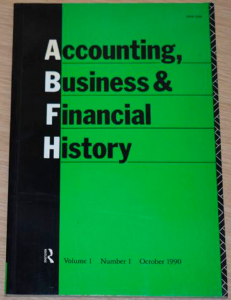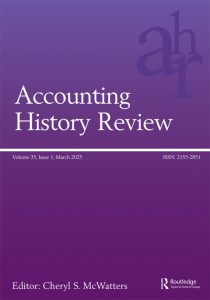HISTORY
A Short History of Accounting History Review (1990 – 2025)
The year 2025 marks the thirty-fifth anniversary of Accounting History Review. The journal was founded as Accounting, Business & Financial History (ABFH) and has since evolved into Accounting History Review (AHR). Over the past three and a half decades, it has not only chronicled debates in accounting history but has also helped to shape them, acting as the scholarly hub around which a vibrant international community has grown.
Cardiff roots and the first issue (1989 – 1990)
The story starts in Cardiff in 1988, when the newly created Business History Research Unit (BHRU) at Cardiff Business School decided to celebrate its formation with a one-off conference in September 1989. Realising that British scholars lacked a dedicated outlet integrating accounting, business and financial history, conference organisers John R. “Dick” Edwards and Trevor Boyns approached Routledge with a journal proposal. After favourable referees’ reports from leading figures such as Anthony Hopwood, Geoffrey Jones and Bob Parker, Routledge agreed to launch ABFH.  The inaugural issue appeared in October 1990, completing a three-issue Volume 1 over the following twelve months.
The inaugural issue appeared in October 1990, completing a three-issue Volume 1 over the following twelve months.
From the outset the journal was deliberately interdisciplinary. Its first editorial board included scholars from accounting, business and financial history across five continents, signalling a desire to avoid parochialism and to encourage cross-fertilisation of methods and sources. ABFH initially appeared twice a year, but a healthy flow of submissions persuaded the publisher to expand to three issues annually from Volume 3 (1993) onwards.
The annual Cardiff Conference quickly became ABFH’s companion institution. What had been conceived as a single event was repeated each September, because it proved an invaluable pipeline of high-quality papers and a meeting place for emerging networks. The ‘one-off’ therefore ran uninterrupted from 1989 until 2011, by which time it had welcomed almost 350 different researchers. The conference ‘begat the journal; the journal, in turn, sustained the conference’, as Boyns later reflected. Many special issues – the first appearing in 1994 – grew directly out of conference sessions and broadened the journal’s geographical and thematic horizons.
Rebranding and renewal (2011)

By 2011 the journal’s subject matter had diversified well beyond its original triad, and a new editorial team led by Stephen J. Walker wished to signal a sharper focus on historical scholarship per se. Moreover, Taylor & Francis sought to distinguish ABFH from its other history journals. Volume 21 therefore introduced the new title Accounting History Review, aligning the journal’s name with its evolving content and readership. In the same year, the long-running Cardiff Conference drew to a close, its mission judged complete as responsibilities and editorship moved to new hands. In 2014, Cheryl S. McWatters became the first woman editor, as well as the first editor based outside the UK, since the journal’s inception. From 2019 onwards, reflecting a significant shift in scholarship from accounting history to accounting in history, and encouraged by several scholars, there was a renewed return to the ‘Cardiff’ roots, marked by the reintroduction of the annual conference. That year, the conference was hosted by the Business School at Edge Hill University, while Paris was selected for the 2020 edition, in collaboration with Université Paris-Dauphine (cancelled due to the COVID-19 pandemic).
Looking back: the thirtieth volume (2020)
The publication of Volume 30 in 2020 provided an opportunity to take stock. In her editorial ‘Accounts and Assemblage’, Cheryl McWatters observed that contributors over three decades had embraced ever richer archives, theoretical lenses and storytelling techniques, creating ‘a plethora of topics and approaches’ while maintaining an emphasis on rigour and evidence. This volume also carried Boyns’ detailed retrospective on the Cardiff years, ensuring the journal’s own institutional memory was itself recorded in its pages.
A living forum in its thirty-fifth year (2025)
Since 2020, AHR has continued to broaden its international footprint and the range of conversations it hosts, building on three decades of research that has crossed both time and space. It has fostered linkages in Australasia, particularly with the Association of Academic Historians in Business Schools (AAHBS) including a special issue in 2020 on interdisciplinary historical studies. The joint conference held in Nantes in 2023 with the AHMO (Association pour l’Histoire du Management et des Organisations), entitled ‘Patrimony: Acquisition and Transmission’, consolidated a longstanding collaboration.
Later that same year, in partnership with the University of Messina, the journal hosted a workshop at the Interdisciplinary Regional Museum on ‘Accounting [in] History over Time, Space, and Subjects: Tradition, Innovation, and Hybridisation’.
Looking ahead, the annual AHR Conference will return to Sicily on 25-26 September 2025, this time on the neighbouring island of Lipari, under the banner ‘Accounting and the Sea: We all count what comes from it’. Plans are already in motion for June 2026, when the conference will travel to Japan and be hosted at Tokyo Metropolitan University.
Enduring mission
Across thirty-five years Accounting History Review has remained faithful to its founding ambition: to use accounting evidence as a lens through which to understand economic and social change.
The forthcoming sequence – from Edge Hill to Lipari to Tokyo – shows how a venture launched in a Cardiff seminar room now spans five continents, forging partnerships with networks such as AHMO and nurturing fresh voices through workshops and themed colloquia.
Whether via annual conferences, ad hoc symposia or collaborative ventures, the journal continues to provide a trusted venue for methodological experimentation, substantive breadth and lively debate.
As we celebrate this milestone, the editorial team renews its invitation to authors who wish to investigate accounting’s past – not as an end in itself, but as a way to illuminate human enterprise in all its richness. In doing so, AHR will carry forward the spirit that has animated it since 1990, ensuring that, for decades to come, we keep taking stock of the stories numbers can tell.
